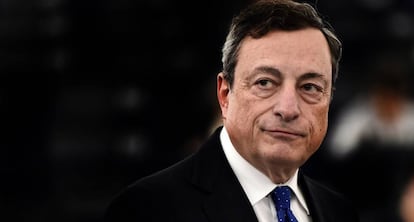¡°Political uncertainty is dominant¡±
The guardian of european monetary policy announces that interest rates will rise when the recovery ends

Mario Draghi (Rome, 1947) is one of those characters who fill a room the moment they enter it. As president of the European Central Bank (ECB), he saved the single currency from two existential crises; during one of them, without spending a single euro. He combines courage, the principal virtue he learned from his father šC "Something that's much more important than money: if you lose it you won't get it back" šC with a refinement, which speaks to his Italian DNA, but is at the same time contained.
He listens with his eyes, he speaks with a gentle cadence, he controls the movement of his hands in an exercise of self-control. But when the moment arrives he gets right to the point: back in his day, he won over German Chancellor Angela Merkel on the European version of quantitative easing (QE), the bond-buying program, and he now speaks with a rare clarity of the political transformations seen during this never-ending crisis.
Draghi's employment history includes spells at the Bank of Italy and Goldman Sachs, but first he got his doctorate at the legendary MIT in the United States, as well as being schooled in the noble art of the counterattack. When, in his office on the 40th floor of the Frankfurt HQ, he wants to bring down the tone of one of those questions that a central banker is not permitted to answer, but which the journalists are obliged to put to him šC about the immediate future of his monetary policy šC he finds a way of breaking the rhythm. He orders coffees, he entertains with an anecdote about soccer, he laughs heartily... But even so, he sketches out clues with words, with nuances, emphases: it will be down to the reader, on occasion, to discover them in this first interview with a Spanish media outlet just ahead of his visit to Madrid today, to give a conference at the Deusto business school as part of its centenary celebrations.
Question. Is Europe at risk?
Answer. The recovery šC albeit modest šC is robust. We are growing and inflation is improving. Europe¡¯s GDP has returned to its pre-crisis level, although this has taken seven-and-a-half years. In the past four years Europe has created four million jobs and the rate of unemployment has dropped from 13% to 10%. There are still big differences between countries, but fewer differences than before. The main drivers behind this recovery have been low oil prices and our monetary policy. This recovery is stronger than past ones because it is based on the increase in consumption and domestic demand, and not only on exports. The recovery in consumption is essentially due to rising real disposable income, and the major driver, now that the oil price effect is waning, is our monetary policy.
Q. But politics could ruin it.
A. Indeed, political uncertainty is dominant. This year we have suffered a multitude of uncertainties: first there was the slowdown in China and the stagnation of world trade, then the Brexit referendum and the election in the United States. The key question is how much this political uncertainty is going to affect the economic recovery. So far we¡¯ve seen that in the short-term the response to these uncertainties has been more muted than people expected. We¡¯ve seen markets reacting quite strongly in the immediate aftermath, but then they¡¯ve recovered to the pre-event level.
Q: Is there a risk of going back to the 1930s, with its protectionism and authoritarianism?
In the medium term it is not yet clear what the consequences of past, current and future political uncertainty will be
A: Let¡¯s look at it one step at a time. All in all the banking sector, and perhaps more generally the financial sector, is stronger than it used to be before the crisis. But in the medium term it is not yet clear what the consequences of past, current and future political uncertainty will be. There will be consequences, that much is certain.
Q. If there is a Brexit in the end...
A. Which we have to assume. A lot depends on the shape of the final agreement and on how long negotiations on the final settlement will take.. The longer the negotiations take, the longer the uncertainty. It will be more difficult for investors and other economic agents in the UK to make decisions. Now, the impact of course is going to be stronger on the UK than it is on the EU and on the euro area, but certainly the UK is a large economy, so it will have an effect here too..
Q. Looking at Brexit, the US election and populism in general, is the international liberal democratic order at risk?
A. The key question is whether and how this will affect our European values and how we will go about protecting these values. The main concerns of EU citizens are now immigration, counter-terrorist security measures, defense and border protection. All of these are supranational affairs that require a common response. European integration is the appropriate response, but this has become weaker in recent times, partly because of populist movements. It is increasingly difficult to make progress with integration, but at the same time citizens want European policies on security and defense. That¡¯s also a way to build Europe.
Q. Could the impending Italian referendum and elections in other countries result in the same kind of turbulence we saw in the bond markets in 2012?
A. I can¡¯t comment on future political events. What we know is we have an objective which is price stability and we have instruments to achieve that. How can we best contribute to confidence and stability? Through fulfilling that mandate.
It is increasingly difficult to make progress with integration, but at the same time citizens want European policies on security and defense
Q. During your term in office, the ECB has saved the euro on two occasions. In 2012, with 1 trillion in liquidity and that phrase ¡°whatever it takes,¡± and since 2014 with quantitative easing (QE), the asset purchase program. Will there be a third occasion?
A. I hope not. The crisis resulted in very difficult times for everyone. We have hopefully learned the lessons and the economic policy agenda has been designed on the basis of those lessons.
Q. Did QE and low interest rates prevent a third recession?
A. Our measures have been very effective. The financial fragmentation between countries with stronger economies and vulnerable countries has been reduced greatly. There was a point in time when we lowered our interest rates and banks did not pass these on to their customers; now they do. There was a time when countries and private companies were paying tremendously different interest rates regardless of the different risk premia. A company with subsidiaries in two countries paid very different interest rates via each subsidiary, with exactly the same risk. We all agree that different rates should reflect different risks but in that case the rates were reflecting other factors. That is no longer the case. Credit provision collapsed and is now starting to grow again.
Q. But not by much.
A. Surveys reveal that access to credit is no longer cited as a problem. Three and a half years ago access to credit was cited by small and medium sized enterprises (SMEs) as the second factor that inhibited investment, and that problem has disappeared. We have also seen that the spread between the rates at which large companies and SMEs borrow has fallen. When the ECB buys bonds from large corporations, they are less reliant on bank funding and that frees up space on bank balance sheets to lend to SMEs.
Q. Won¡¯t your non-standard measures have harmful effects?
A. We are monitoring financial stability risks, but we see no bubbles in the euro area. There are house price increases in Milan, Barcelona and some German cities, but they are selective and limited to specific areas. In order to speak of bubbles there must be a hike in prices and strong increases in lending. We are not seeing that dynamic. Lending is growing, but at rates of 3%, not at the 15% we saw before the crisis.
Low interest rates are essential for a full recovery, and when this is achieved interest rates will rise
Q. They are causing problems of inequality.
A. I disagree. Although asset purchases mean asset prices rise, one should never forget that the single biggest cause of inequality is unemployment. So if you look at the medium-term consequences of increasing employment and you match them against the short-term consequences of worsening inequality, the overall answer is no, QE doesn't increase inequality.
Q. The low interest rates are beneficial to many but harmful to some.
A. We are aware that low interest rates affect the interest rate margins of some banks, but they also have positive effects on bank profitability by supporting the recovery, reducing loan losses and increasing the valuation of assets. We also cannot deny that some people, like pensioners without debt who rent their homes, may be hurt by low interest rates. The only honest answer that we can give them is that the low interest rates are essential for a full recovery, and when this is achieved interest rates will rise.
Q. European growth is mediocre. Unemployment stands at 10%. Inflation is far from 2%. With these figures, how can the ECB hawks even think of demanding the gradual withdrawal of unconventional measures, low interest rates and asset purchases?
A. We have never discussed this in the Governing Council.
Q. In December, will QE be extended beyond March 2017 and the size of monthly purchases reduced?
A. This is for the Governing Council to decide and it will do so on December 8. Right now, our latest introductory statement says that we remain committed to preserving the very substantial degree of monetary accommodation which is necessary to secure a sustained convergence of inflation towards levels below, but close to, 2% over the medium term.
Q. But the markets are waiting to see the steps you take in December.
A. This is normal, especially in a context where monetary policy makes use of more instruments than in the past. We can deliver the appropriate stance by different combinations of instruments, for instance the amount of monthly purchases or the length of time over which they take place. I won¡¯t prejudge the debate on the various options.
Q. But it will be serious and intense, won¡¯t it?
A. Governing Council meetings are always interesting.
Q. For two years, since the speech you made in Jackson Hole, you have been preaching unsuccessfully to have your expansive monetary policy complemented by an expansive fiscal policy. Now Brussels is proposing a stimulus. Will you support the European Commission vis-š€-vis the finance ministers?
A. We are still assessing the proposal. Fiscal policy should support the recovery but also comply with the rules of the Stability and Growth Pact, which have enough flexibility of interpretation to accommodate extraordinary factors and structural reforms. Compliance with well-designed rules is essential to create confidence in the markets and credibility for governments: only if there is trust between countries can we progress towards deeper integration.
Only if there is trust between countries can we progress towards deeper integration
Q. Confidence has disappeared. The rules were never complied with. There have been many reforms yet the rules are still being breached. Shouldn¡¯t the rules be replaced with others?
A. Fiscal policy in the EU is basically a rules-based process and it is the Commission¡¯s task to monitor compliance. Let¡¯s take a step back. In monetary policy we have followed a different route: we have moved from a rules-based system to an institutions-based monetary integration system. Which produces the best results? Judge for yourselves.
Q. What our readers are interested in is your opinion.
A. Well they can form an opinion on the ECB by judging us on how we comply with our mandate, price stability. And I would say in spite of the many crises of the last six, seven years, we continue to steer the ship towards this mandate, and we foresee that inflation will go back towards our objective of an inflation rate below but close to 2% by 2018/2019.
Q. What was the size of the stimulus you were thinking of when you began to ask for more active fiscal policies?
A. The euro area is made up of many different countries, which implies different fiscal policies in 19 countries. But if the crisis has clarified one thing it is that many Member States did not have sustainable fiscal positions. There was no fiscal space to combat the crisis.
Q. The United States has been more flexible with its own rules: its recovery took place earlier and has been much stronger. Shouldn¡¯t this also make us think of changing the rules?
A. The US institutional environment is completely different: it has a genuine federal budget; a fully integrated financial market and a very different society. So it's hard to compare. However, if your question is what makes the two crises different, then that is important because it forces us to think about the mistakes made before the crisis. They would be the major input in how to design a program for after the crisis.
Q. Why are the outcomes of the two crises so different?
A. One of the main reasons for the financial crisis was the blind deregulation that took place in the early 2000s and late 1990s. This led to the creation of toxic assets, to market opacity and to the excesses that triggered the global financial crisis and the recession. In the United States, the origin of the crisis was mainly financial. It then spread to Europe šC to its banks, to its governments, to a very indebted economy, to a banking sector that was also undercapitalized šC and led to a credit crunch. The damage was greater in Europe because underlying these symptoms was a competitiveness that had been in decline for years on account of a lack of structural reforms. This crisis taught us several lessons. One is that a fiscal space needs to be created so it can be used in the event of another crisis. Whoever has such a space can use it; whoever doesn¡¯t will only be able to alter the composition of the budget: less expenditure, lower taxes and more public investment well targeted to increase productivity for the country. The second lesson is that the banking sector must be strengthened: the highest quality capital, common equity tier 1 capital, has gone from 7% before the crisis to around 14% now. And the third lesson is that reforms are needed to regain competitiveness, so that we are prepared if problems reoccur. Spain undertook reforms, and therefore its growth is striking and its rate of unemployment significantly lower than before.
Q. Spain¡¯s GDP is growing strongly, but unemployment is still at around 20%. Spain has the highest deficit in Europe after Greece. Massive debt. Doesn¡¯t this mean that Spain is still very vulnerable?
A. Spain is growing more than others, but it is still vulnerable. It has a high deficit and high public and private debt. But what is important is that Europe is emerging from the crisis. And Spain is coming out faster basically because it has undertaken more structural reforms.
Q. Spain¡¯s economy has benefited more than others from the drop in oil prices and low interest rates by being very much in debt.
A. The tailwinds have been there for everyone. It is certainly true also that monetary policy is a driver of the recovery, across the euro area.
Q. Does Spain tend to forget that half of the work has been done by these tailwinds?
A. It is also true that Spain enacted reforms and repaired its financial sector earlier than others, which has proved crucial.
Q. In a country with a certain fatigue because of the cuts made and the two labor reforms and the financial and pension reforms, could another round of cuts to the tune of 5.5 billion šC as has been demanded by Brussels šC be counterproductive?
A. As I said before, fiscal policy could complement our monetary policy, together with structural reforms, in sustaining the recovery. But this should be done in compliance with the existing rules and where the existing rules are being administered and monitored by the Commission.
Q. If there is another crisis, we cannot rule out a new episode of turbulence in the banking sector, with weaknesses in several countries. Does the Bank Recovery and Resolution Directive [which lays down creditor ranking when their money is lost during a banking crisis] need to be strictly enforced? Should it be disregarded if there is a new financial crisis?
A. During the crisis, everyone was insisting that taxpayers must no longer pay any more for the mistakes of the financial sector and of the banks. The outcome was the Bank Recovery and Resolution Directive. However, both the Directive and the rules on state aid leave room for interpretation by the Commission. But let me say that the best protection against rules that require creditors to contribute to bank recoveries šC something which is often associated with serious political and economic problems šC is for all banks to have buffers in place in case there are problems, with assets that can be used easily to absorb losses. That is key.
Tu suscripciš®n se estš¢ usando en otro dispositivo
?Quieres a?adir otro usuario a tu suscripciš®n?
Si continš²as leyendo en este dispositivo, no se podrš¢ leer en el otro.
FlechaTu suscripciš®n se estš¢ usando en otro dispositivo y solo puedes acceder a EL PA?S desde un dispositivo a la vez.
Si quieres compartir tu cuenta, cambia tu suscripciš®n a la modalidad Premium, asšª podrš¢s a?adir otro usuario. Cada uno accederš¢ con su propia cuenta de email, lo que os permitirš¢ personalizar vuestra experiencia en EL PA?S.
En el caso de no saber quišŠn estš¢ usando tu cuenta, te recomendamos cambiar tu contrase?a aqušª.
Si decides continuar compartiendo tu cuenta, este mensaje se mostrarš¢ en tu dispositivo y en el de la otra persona que estš¢ usando tu cuenta de forma indefinida, afectando a tu experiencia de lectura. Puedes consultar aqušª los tšŠrminos y condiciones de la suscripciš®n digital.
































































